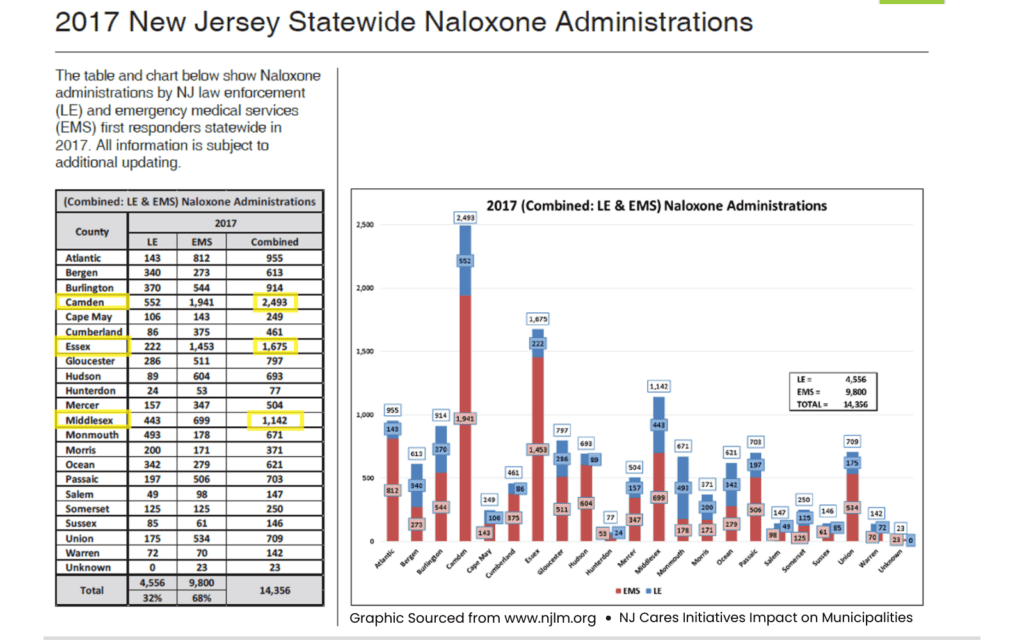In confronting the opioid epidemic, New Jersey finds itself at the epicenter of a significant public health challenge, with a crisis that spans across its 21 counties. Fentanyl, a synthetic opioid with a potency far exceeding that of morphine, has become a key factor in escalating the severity of this issue. According to Sharon Joyce, AAG, in an article titled “NJ Cares Initiatives Impact on Municipalities,” the state has seen a distressing increase in incidents related to fentanyl. Data reveals a consistent rise in suspected heroin samples testing positive for fentanyl and its derivatives. This concern is further magnified by the dramatic escalation in fentanyl-related fatalities, with a 209% increase from 2013 to 2014 (from 46 to 142 deaths), a 194% jump from 2014 to 2015 (from 142 to 417 deaths), and a 135% climb from 2015 to 2016 (from 417 to 982 deaths).
These figures underscore the severe impact of the fentanyl crisis in New Jersey, emphasizing the critical need for effective addiction treatment solutions. At Rubicon Recovery Center, we recognize the complexities of fentanyl addiction and are dedicated to providing comprehensive treatment options. Our strategies are designed to meet the unique needs of those struggling with this formidable challenge, employing proven interventions and supportive care to aid in recovery and build resilience. Against the backdrop of these stark statistics, our commitment to addressing the fentanyl epidemic is unwavering, as we strive to offer support, recovery, and hope to those affected.

What Is Fentanyl Addiction?
Fentanyl addiction occurs when an individual develops a dependency on fentanyl, a powerful synthetic opioid. Originally developed for severe pain management, Fentanyl is estimated to be 50 to 100 times more powerful than morphine. The misuse of fentanyl and its unknown or undisclosed presence in other street drugs such as cocaine and heroin has led to a dramatic increase in overdose deaths.
Like all opioids, using fentanyl results in feelings of intense euphoria or bliss, temporarily reducing physical and emotional pain for the user. This euphoric effect often leads to a cycle of compulsive continued use, leading to a physical, mental, and emotional dependence despite any negative effects that occur from using the drug.
Fentanyl is one of the most dangerous drug addictions affecting people today and requires professional treatment. It’s helpful to understand more about how to treat a fentanyl addiction and what challenges may come up on the road to recovery so that you can get yourself or a loved one the help they need to heal.
Who Needs Rehab For Fentanyl Addiction?
The outpatient addiction rehab at Rubicon Recovery Center is designed for any individual who finds themselves unable to stop using fentanyl despite experiencing negative consequences such as significant harm to their health, relationships, and day to day well being. We welcome people from all backgrounds who are struggling with fentanyl addiction, no matter their prior history of drug use, overdose, or previous attempts at recovery.
Fentanyl addiction can look different for different people, but you may need to attend a rehab program if you are experiencing any of the following behaviors:
- Withdrawal Symptoms: The presence of withdrawal symptoms signifies that an individual has developed a physical dependence on a drug, which is a key component of addiction. Some fentanyl withdrawal symptoms include nausea, sweating, insomnia, and muscle pain
- Change in Social Circles: A subtle yet telling sign of drug addiction is a significant change in an individual’s social circles. Someone might withdraw from long-standing relationships and instead spend time with new friends who share and enable their drug use habits. Losing interest in social activities or hobbies that don’t involve drug use is also related to this sign.
- Neglecting Responsibilities: A hallmark sign of addiction is when an individual starts to neglect responsibilities at home, work, or school. Financial problems may also arise, often due to spending money on drugs rather than on bills, food, or other essentials.
- Decline in Wellbeing: Fentynal addiction can lead to noticeable declines in physical health and appearance. Some tell tale signs may include sudden weight loss or gain, poor skin condition, and neglect of personal hygiene. Sleep patterns may also be disrupted, leading to insomnia or excessive sleeping.
Our Approach To Fentanyl Treatment In New Jersey
At Rubicon Recovery, our approach to fentanyl treatment is rooted in evidence-based practices and personalized care. We recognize that each individual’s journey is unique and requires a personalized approach. Our team of dedicated professionals is committed to creating a tailored treatment plan that meets your specific needs, right now.
- Individual and Group Therapy: We offer individual and group therapy sessions that are designed to address the psychological and emotional components of addiction. Therapy helps individuals uncover and understand the root causes of their addiction, develop coping strategies, and build a supportive community.
- Detoxification: While Rubicon Recovery Center does not provide detox services, we facilitate access to reputable detox programs for our clients. Our partner detoxification programs are supervised by medical experts, ensuring a safe withdrawal from fentanyl. A comprehensive detox program will build the foundation for a powerful recovery journey with us.
- Therapy and Counseling: We offer a range of therapeutic modalities, including individual counseling, group therapy, and family support sessions, designed to address the emotional and psychological root causes of addiction.
- Holistic Therapies: Incorporating holistic therapies such as mindfulness, yoga, and art therapy, helps individuals find balance and healing beyond traditional treatment methods and provides them with tools they can use in their everyday lives.
- Aftercare Planning: We believe that recovery is a lifelong journey, which is why we provide comprehensive aftercare planning to support our clients long after they leave our facility.
Healing from fentanyl addiction often requires professional support and comprehensive treatment, beginning with a medically supervised detox, and a tailored plan that includes therapy and counseling.
Although recovery can be a challenging journey, the right support and care can empower individuals to achieve lasting recovery and live drug-free lives.
How to Find Fentanyl Addiction Treatment In New Jersey
Compassionate Addiction Outpatient Treatment In New Jersey
Facing any addiction is not for the faint of heart, but at Rubicon Recovery in New Jersey, we are here to support you every step of the way. Our comprehensive fentanyl rehab and treatment programs are designed with care and expertise to provide the tools and support you need. Our healing center offers a peaceful and private environment where you can focus on healing and help move you toward a drug-free life.
Connect with us today to take a bold step forward on your journey to recovery from fentanyl addiction. Our dedicated team is ready to guide you through our personalized treatment process and help you find the clarity you need to step toward a brighter, drug-free future.
Frequently Asked Questions
How long does fentanyl rehab take?
The duration of fentanyl rehab varies depending on the individual’s specific needs, the severity of the addiction, and their progress in treatment. Typically, programs last from a minimum of 30 days to several months.
Can fentanyl addiction be cured?
While any drug addiction is considered a chronic disease, a fentanyl addiction can be effectively managed with the right treatment and support. Many individuals achieve long-term recovery and lead fulfilling lives post-rehabilitation.
What types of fentanyl rehab and treatment services are available at Rubicon Recovery Center?
In New Jersey, we offer a comprehensive range of fentanyl rehab services including detoxification referrals, outpatient treatment programs, as well as individual and group therapy and long-term aftercare support.
What should I do if I'm addicted to both Xanax and fentanyl?
If you’re struggling with addiction to both Xanax and fentanyl, it’s crucial to seek comprehensive treatment that addresses the complexities of polydrug abuse. At Rubicon Recovery Center, we offer integrated treatment programs that cater to the unique challenges of concurrent benzodiazepine and opioid addiction, focusing on both medical detoxification and psychological support.
